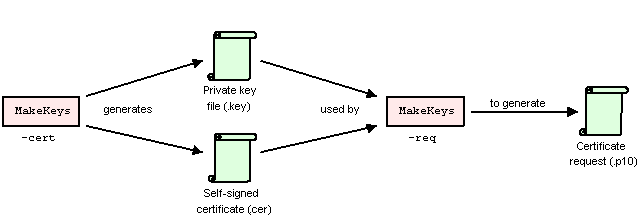The MakeKeys tool creates private key-public key pair and certificate requests. Symbian's secure software installation system allows users, prior to installing software, to:. Creates a private key private-key-file and self-signed certificate public-key-cert. This information is valid for Series 80 phones only. The Certification Generator creates a self signed certificate, which can be used for testing purposes. Run MakeSIS to create the unsigned installation file. 
| Uploader: | Mezirr |
| Date Added: | 15 December 2013 |
| File Size: | 55.8 Mb |
| Operating Systems: | Windows NT/2000/XP/2003/2003/7/8/10 MacOS 10/X |
| Downloads: | 31865 |
| Price: | Free* [*Free Regsitration Required] |
If different keys are used for encryption and decryption, they are asymmetric. The items with emphasis should be replaced with your own values.
Can anyone suggest the right way to do this please? Then again, if you are targeting for pre-3rd edition devices, then they are not requiring any signing, thus you could extract the files, modify them, and simply repack with makesis. How do we handle problem users? For details, see Certificates. I need to be able to view and edit a. This section gives an overview of public-key, or asymmetric, cryptography which is used in the installation of software components. The private key can then be used by the SignSIS tool to digitally sign an installation file.
Creating Self-signed Symbian OS Certificates
How to digitally sign an installation file. If the private key file exists, it is used to create the self-signed certificate. Submit the certificate request to a Certification Authority and receive an authenticated digital certificate. Certification Authority CAs is a trusted third party that provides root certificates to users End Entities.
MakeKeys Reference
How do I decompile a. The resulting certificate from these steps can be installed on a communicator.

A key is a constant value applied using a cryptographic algorithm to encrypt text or to decrypt encrypted text. Key concepts and terms Key A key is a constant value applied using a cryptographic algorithm to xymbian text or to decrypt encrypted text. Because the certificate is self-signed, the device will not trust it by default.
Creating Self-signed Symbian OS Certificates
Sign the the installation file using SignSIS. Prabowo Murti Prabowo Murti 15 15 silver badges 22 22 bronze badges. Keys are classified as symmetric and asymmetric based on the type of algorithm applied. It is then up to the Symbian developer to send the file to the CA and arrange for the application for the certificate. Specifies the password for private key. The default key-length is For details, see Digital Signatures. Run MakeSIS to create the unsigned installation file. After creating private key-public key pair, a password must be provided to subsequently use the private key.
For some reason, makekeys creates certificate files that the certificate manager software cannot read. Run MakeKeys to create a certificate request. Similarly, messages encrypted using the public key can only be decrypted by the private key.
Most of this information comes from the SDK, but some issues such as certificate conversion are not described there.
MakeKeys Overview The MakeKeys tool is a PC-side command-line tool that enables Symbian application developers to create a symhian key-public key pair and generate certificate requests. Sign up using Facebook.
This process is documented in the SDK, but, briefly, the steps are the following:. Symbian's secure software installation system allows users, prior to installing software, to:. A self-contained file which is sent to the Certification Authority CA for signing.

To verify the signature, the user decrypts the hash value using the public key provided, and also recalculates the hash value from the data.

No comments:
Post a Comment